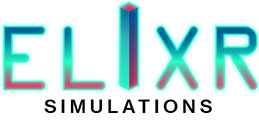NorQuest’s VR training is for job seekers who are struggling to secure work in their field, employers who are interested in improving their business communication and HR processes, and post-secondary institutions who are searching for a way to assist their new graduates with transitions into employment. Training sessions are facilitated in a safe and controlled environment, either at NorQuest or at employers’ workplaces.
Benefits for job seekers
We all know how the common saying goes: practice makes perfect. In this VR training, job seekers can practice a wide range of scenarios, so they can improve their soft skills and increase their confidence. Job seekers will learn the following skills:
- Improving interview performance
- Understanding interview etiquette and strategies
- Having difficult conversations and navigating difficult questions
- Advocating for themselves in the job search
- Effectively asking for help
- Meeting new colleagues
Interview training for job seekers.
Benefits for employers
Many employers are struggling with finding and keeping staff, this VR training will help employers create better HR processes and improve business communication, so they can find the right candidates for their roles and retain their employees. They’ll learn how to:
- Navigate expectations and bias
- Craft effective and inclusive job postings to get the people the organization really needs
- Create spaces for psychological safety
- Devise efficient and inexpensive workplace accommodations for employees
- Experience challenging work scenarios and communicate effectively around them
Benefits for other post-secondary institutions
Post-secondary institutions are constantly searching for ways to reduce barriers for their learners and improve their job prospects. Through this VR training, post-secondary institutions can equip their students and new graduates with in-demand skills needed in today’s job market. Some of the benefits include:
- Helping students maximize their post-secondary success and secure a job in their field of study
- Improve access to rapid skills training in rural communities
- Relieve hiring hesitation for employers and increase inclusivity in the workplace
Collaborate with us
Frequently asked questions
-
Are there any safety concerns with VR simulations?
While there is a risk of VR Sickness, these are individualized experiences. Our facilitators will teach participants the proper use of the VR equipment and communicate important health and safety information to reduce discomfort. Participants usually finish the 15–25-minute trainings without needing breaks, but there is plenty of time to rest if needed. If the participant experiences or is concerned about experiencing VR sickness, we also offer video playthroughs that participants can watch, as a backup plan.
-
How long will it take?
Each module of a training scenario takes between four and seven minutes to complete. A full training scenario usually takes about twenty-five minutes. When all our training scenarios are developed, a complete experience of all scenarios may take up to two hours. In this case, we recommend staggered sessions to allow time to digest the information and prevent VR sickness
-
Is there a grading system?
Creating a low-pressure, safe environment is the priority in our training, and we avoid the use of grading and testing as a result. Participants can take as long as they need to progress through the training.
-
Is the training free?
Yes! There is no cost to undertake this training.

